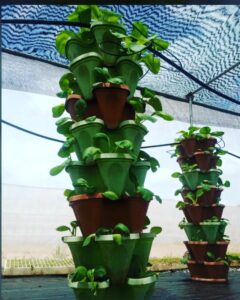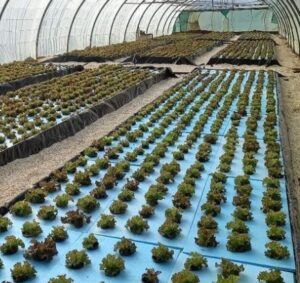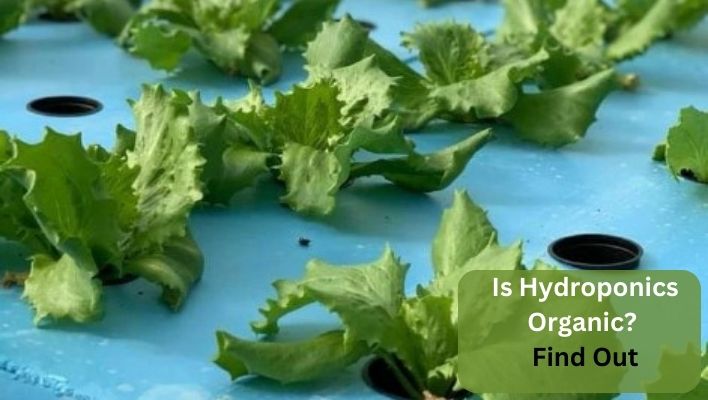Is hydroponics organic? .Hydroponics is an innovative method of farming that has gained popularity in recent years. It involves growing plants in nutrient-rich water, without soil, and is often touted as a more sustainable and efficient way of producing food.
On the other hand, organic farming is a traditional method that relies on natural inputs like compost and manure to grow crops.
However, when it comes to the question of whether hydroponics is organic, there is much debate. In this article, we will explore the various arguments for and against hydroponics being considered organic and the pros and cons of using hydroponics for organic farming.
By the end of this article, you’ll better understand the relationship between hydroponics and organic farming and whether hydroponic crops can truly be considered organic.
What is Hydroponics?
Hydroponics is a method of growing plants without soil, where the plants are instead grown in nutrient-rich water. This water is constantly recirculated, giving the plants the necessary nutrients to grow.
Hydroponic systems can range from simple setups like a basic bucket or container to more complex systems with automated nutrient delivery and environmental control.
One of the benefits of hydroponics is that it allows for more precise control over plant growth. With traditional soil-based farming, the nutrients that plants receive can vary widely depending on the quality of the soil.
However, in hydroponics, nutrients can be carefully controlled and monitored, ensuring plants receive what they need to thrive.

Additionally, hydroponic systems can be set up in various locations, making them ideal for urban environments or areas with limited space for traditional farming.
However, there are also drawbacks to hydroponics. For one, hydroponic systems require significant energy to operate, particularly for larger commercial setups.
Also, some critics argue that hydroponic farming can be less sustainable than traditional farming methods due to the need for synthetic nutrients and energy input.
Nevertheless, proponents of hydroponics argue that it can be a more efficient and sustainable way of producing food, particularly when producing high-yield crops like leafy greens or herbs. it is also important to note that hydroponics is different from aquaponics.
What is Organic Farming?
Organic farming is a method of growing crops and raising livestock without the use of synthetic fertilizers, pesticides, or other chemicals. Instead, organic farming relies on natural pest control and nutrient management methods, such as crop rotation, composting, and natural predators.
Several principles guide organic farming, including the promotion of biodiversity, the conservation of natural resources, and the use of renewable resources. Organic farming also emphasizes the well-being of animals, promoting free-range grazing and prohibiting the use of hormones and antibiotics in livestock.
One of the benefits of organic farming is that it can be more environmentally sustainable than traditional farming methods.
By avoiding the use of synthetic chemicals and promoting natural methods of pest control and nutrient management, organic farming can help reduce the negative impacts of agriculture on the environment.
Additionally, organic food is often perceived as being healthier and safer than conventionally-grown food due to the lack of synthetic chemicals.
However, there are also some drawbacks to organic farming. For one, organic crops can be more expensive to produce, translating into higher consumer prices.
Additionally, organic farming methods can sometimes be less efficient than traditional methods, leading to lower yields and less productivity.
Overall, organic farming represents a different approach to agriculture, emphasizing natural pest control and nutrient management methods.
While organic farming has some drawbacks, many people believe it can be a more environmentally sustainable and healthy way of producing food.
Is Hydroponics Organic?
Whether hydroponics can be considered organic is controversial, and there are strong arguments on both sides of the debate.
Some proponents of hydroponics argue that it can be a more efficient and sustainable way of producing food, particularly in urban areas or regions with limited water resources.
Others, however, argue that hydroponics is not truly organic due to the lack of soil and the reliance on synthetic nutrients.
Arguments in Favor of Hydroponics as Organic:
One argument favoring hydroponics as organic is that it can still promote sustainability and natural pest control methods, even without soil.
Additionally, hydroponic systems can be designed to mimic natural ecosystems, promoting biodiversity and reducing the need for synthetic chemicals.
Finally, some proponents of hydroponics argue that it can help meet the growing demand for organic food, particularly in regions where traditional farming is impossible.
They also argue that synthetic nutrient solutions are no different from using organic fertilizers as long as the nutrients are derived from natural sources.

Arguments Against Hydroponics as Organic:
On the other hand, critics of hydroponics argue that it is not truly organic since the lack of soil means that the plants are not subject to the same natural processes as traditional farming.
Also, hydroponic systems are less environmentally sustainable than traditional organic farming methods since they require significant energy to operate.
Additionally, hydroponic systems rely on synthetic nutrients and other inputs, which are prohibited under some organic certification standards.
They believe using synthetic nutrient solutions can lead to the accumulation of harmful salts in the growing medium, which can harm the plants and the environment.
Finally, some critics argue that allowing hydroponics to be considered organic could dilute organic standards, making it more difficult to ensure that organic food is truly natural and sustainable.
Organic Certification Organizations and Hydroponics:
Different organic certification organizations approach the issue of hydroponics differently. The United States Department of Agriculture (USDA), which regulates organic certification in the United States, currently allows hydroponic crops to be certified as organic as long as they meet certain requirements.
Others, like the Soil Association in the UK, do not allow hydroponics to be considered organic, citing concerns over sustainability and the lack of natural processes.
Ultimately, the decision of whether to consider hydroponics as organic will likely continue to be a topic of debate in the organic farming community.
In summary, whether hydroponics can be considered organic is controversial, with differing opinions among farmers, researchers, and certification organizations.
While there are arguments for and against considering hydroponics as organic, the approaches of different certification organizations vary.
Are hydroponic crops considered organic by the USDA?
Hydroponic crops are considered organic by the USDA as long as they meet the same organic standards and regulations as conventionally grown crops. In 2017, the National Organic Standards Board (NOSB), which advises the USDA on organic standards, voted 8-7 to allow hydroponic and aquaponic systems to be certified organic.
However, there is still ongoing debate within the organic farming community as to whether hydroponic crops should be considered organic. Some argue that the absence of soil undermines the fundamental principles of organic agriculture.
It is important to note that organic certification requirements for hydroponic crops are identical to conventional soil-based crops, including requirements for organic seeds, organic inputs, and adherence to strict record-keeping and inspection protocols.
Ultimately, it is up to individual consumers to decide whether they consider hydroponic crops to be truly organic based on their personal beliefs and values.
Advantages and Disadvantages of Hydroponics as Organic
Advantages of Hydroponics as Organic:
- Controlled Environment: Hydroponic systems are designed to provide a controlled environment, including temperature, humidity, pH, and nutrient levels, allowing farmers to optimize growth conditions for their crops.
- Water Conservation: Hydroponic systems use 90% less water compared to traditional farming methods, as the water is recirculated through the system, reducing waste and conserving resources.
- No Soil Erosion: Hydroponic farming eliminates the need for soil, which can lead to soil erosion and depletion of natural resources.
- No Pesticides: Since hydroponic farming is done in a controlled environment, farmers can avoid using harmful pesticides and herbicides, making it a healthier option for both the environment and the consumer.
- Higher Yields: Hydroponic farming has the potential to produce higher yields than traditional farming methods, as the controlled environment and optimized nutrient levels allow plants to grow faster and stronger.
Disadvantages of Hydroponics as Organic:
- Energy Consumption: Hydroponic systems require a significant amount of energy to operate, including lighting, ventilation, and heating. This can be a major drawback for those looking for a more sustainable and eco-friendly farming method.
- Expensive: Hydroponic systems can be expensive to set up and maintain, making them less accessible to small-scale farmers.
- Limited Crops: Hydroponic farming is best suited for certain crops, such as leafy greens, herbs, and some fruits, while other crops, such as grains and root vegetables, are more difficult to grow in a hydroponic system.
- Dependence on Technology: Hydroponic farming relies heavily on technology, including pumps, timers, and sensors, which can be susceptible to malfunction and require regular maintenance.
- Lack of Soil Benefits: Hydroponic farming provides different soil benefits than traditional farming methods, such as improving soil structure, promoting biodiversity, and providing natural nutrients to plants.
Hydroponic farming can be a viable option for organic farming, but it has limitations and drawbacks. Farmers need to weigh the advantages and disadvantages before deciding on a farming method that best suits their needs and resources.

Is Hydroponics Organic FAQs
How is organic farming different from conventional farming?
Organic farming is a method of agriculture that prioritizes sustainability, soil health, biodiversity, and the use of natural inputs over synthetic chemicals and genetically modified organisms (GMOs).
Organic farmers use practices such as crop rotation, cover cropping, composting, and natural pest management to maintain soil health and fertility and reduce the use of synthetic fertilizers and pesticides.
In contrast, conventional farming uses synthetic chemicals and GMOs to maximize crop yields and protect against pests and diseases, often at the expense of soil health and environmental sustainability.
What are the advantages of using hydroponics for organic farming?
Hydroponics has several advantages for organic farming, including the ability to control the environment in which crops are grown, resulting in higher yields and greater consistency. Hydroponic systems use less water than traditional farming methods and can reduce water waste through recirculation.
Hydroponic farming also eliminates the need for soil, which can reduce soil erosion and depletion of natural resources. Additionally, hydroponic farming can reduce or eliminate the use of synthetic pesticides and herbicides, resulting in a healthier product for both the environment and the consumer.
Are there any disadvantages to using hydroponics for organic farming?
Yes, there are some disadvantages to using hydroponics for organic farming. Hydroponic systems require significant energy inputs, including lighting, heating, and ventilation, which can be expensive and less environmentally sustainable.
Also, Hydroponic systems can be costly to set up and maintain, making them less accessible to small-scale farmers. Hydroponic farming is best suited to certain crops, such as leafy greens and herbs, and may be less effective for other crops, such as grains and root vegetables.
Finally, some people in the organic farming community argue that hydroponic farming does not adhere to the fundamental principles of organic farming, which prioritize using natural inputs and soil health.
Conclusion
Hydroponics can be a viable organic farming method, but it has advantages and disadvantages to consider. Hydroponic systems provide a controlled environment for crops, leading to higher yields and reduced water waste.
However, these systems require significant energy inputs, can be expensive to set up and maintain, and are best suited for certain crops.
Moreover, there is an ongoing debate within the organic farming community about whether hydroponic crops can be considered truly organic.
Ultimately, it is up to individual consumers to decide whether they consider hydroponic crops organic based on their personal beliefs and values.
Answering the question “Is hydroponics organic?” is complex. Still, it can be concluded that hydroponics can be considered organic if they meet the same standards and regulations as conventionally grown crops.
In 2017, the National Organic Standards Board voted to allow hydroponic and aquaponic systems to be certified organic. Still, some argue that hydroponic farming must adhere to the fundamental principles of organic farming, which prioritize soil health and using natural inputs.
Thus, while hydroponic farming can be organic, it is up to individual consumers to decide whether they consider hydroponic crops to be truly organic based on their personal beliefs and values.
